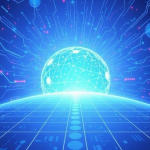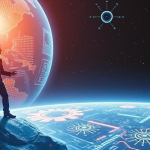The rapid evolution of technology continues to shape the world around us, influencing everything from how we work and communicate to how we travel and heal. In the coming years, breakthroughs in artificial intelligence (AI), quantum computing, biotechnology, and renewable energy promise to redefine our daily lives in unimaginable ways. As we stand on the precipice of a new technological era, let’s explore the key innovations that will transform society and revolutionize industries.
Artificial Intelligence: The Dawn of Superintelligent Machines
Artificial intelligence has already made significant strides, but the next wave of AI development will bring about even more profound changes. The emergence of artificial general intelligence (AGI) promises machines with human-like reasoning and problem-solving capabilities, fundamentally altering the workforce, education, and even governance.
AI-driven automation will continue to reshape industries, from self-driving cars to intelligent robots performing complex surgeries. Personalized AI assistants will become more sophisticated, anticipating our needs and making decisions on our behalf. Ethical considerations surrounding AI bias, security, and employment displacement will require robust regulations and policies to ensure responsible development.
Quantum Computing: The Next Frontier in Computing Power
Quantum computing is set to revolutionize problem-solving by harnessing the principles of quantum mechanics. Unlike classical computers that process information using bits (0s and 1s), quantum computers utilize qubits, allowing for exponentially faster calculations. This breakthrough will have profound implications for cryptography, material science, and artificial intelligence.
One of the most anticipated impacts of quantum computing is the ability to crack existing encryption methods, leading to a new era of cybersecurity protocols. Pharmaceutical companies will leverage quantum simulations to develop life-saving drugs at unprecedented speeds. Despite the challenges in scalability and error correction, companies like Google, IBM, and startups worldwide are making rapid progress toward practical quantum applications.
Biotechnology: Rewriting the Code of Life
Advancements in biotechnology are pushing the boundaries of human health and longevity. CRISPR gene-editing technology, for example, is revolutionizing medicine by enabling scientists to modify DNA with precision. This paves the way for curing genetic diseases, developing personalized medicine, and even enhancing human abilities.
Another game-changing innovation is lab-grown organs and regenerative medicine, which promise to eliminate transplant shortages. Stem cell research is also advancing, offering potential treatments for conditions like Parkinson’s and Alzheimer’s. As biotechnology progresses, ethical dilemmas surrounding gene editing, designer babies, and bio-enhancements will spark global debates on the future of human evolution.
Renewable Energy and the Green Revolution
The world is in urgent need of sustainable energy solutions, and technological innovations are paving the way for a greener future. Solar and wind energy are becoming more efficient and cost-effective, with breakthroughs in energy storage addressing the intermittency problem.
Nuclear fusion, long considered the holy grail of energy, is nearing viability, with experimental reactors like ITER and private initiatives making progress. If successful, fusion energy could provide an unlimited and clean power source, drastically reducing reliance on fossil fuels. Meanwhile, advancements in battery technology, such as solid-state batteries, promise longer-lasting and safer energy storage for electric vehicles and renewable grids.
The Metaverse and the Future of Connectivity
The concept of the metaverse—an interconnected virtual world—has gained significant traction, with tech giants like Meta, Microsoft, and Apple investing heavily in its development. Augmented reality (AR) and virtual reality (VR) technologies will bridge the gap between the physical and digital worlds, transforming entertainment, social interactions, and even work environments.
In the future, people may conduct business meetings in virtual offices, attend concerts from the comfort of their homes, and experience education in immersive, interactive environments. However, privacy concerns, digital addiction, and ethical considerations regarding virtual property and identity will need to be addressed to ensure a safe and equitable metaverse experience.
Space Exploration: The Final Frontier
Humanity’s fascination with space exploration is entering a new golden age, driven by private companies like SpaceX, Blue Origin, and government agencies such as NASA and ESA. Missions to Mars, lunar colonization, and asteroid mining are no longer the realm of science fiction but tangible goals within our lifetime.
Elon Musk’s vision of making humanity a multiplanetary species is progressing with advancements in reusable rockets and the development of Starship. Meanwhile, China’s ambitious space program is rapidly expanding, with plans for moon bases and deep-space missions. The potential discovery of extraterrestrial life and the exploitation of space resources will reshape geopolitics and the global economy.
The Future of Transportation: From Hyperloops to Flying Cars
The way we travel is poised for radical change, with innovations such as the Hyperloop, autonomous vehicles, and urban air mobility on the horizon. Hyperloop technology, championed by companies like Virgin Hyperloop, aims to revolutionize high-speed travel by propelling pods through vacuum tubes at near-supersonic speeds.
Self-driving cars are expected to become mainstream, reducing traffic congestion and improving road safety. Electric vertical takeoff and landing (eVTOL) vehicles, commonly referred to as flying cars, are also in development, potentially transforming urban transportation. While regulatory challenges and infrastructure development remain hurdles, the future of transportation looks increasingly autonomous and efficient.
Robotics and Automation: A New Industrial Revolution
Advancements in robotics are leading to unprecedented levels of automation across industries. From warehouse robots streamlining logistics to humanoid robots assisting in elderly care, the integration of AI-driven machines will redefine labor markets and productivity.
Robotics in agriculture, for instance, will optimize food production through automated planting, harvesting, and monitoring of crops. In healthcare, robotic-assisted surgeries will improve precision, reducing recovery times and improving patient outcomes. However, concerns over job displacement and ethical implications of AI-driven machines require careful consideration and proactive policymaking.
The Ethical and Societal Implications of Emerging Technologies
As we embrace these transformative technologies, ethical and societal questions must be addressed. The rise of AI and automation threatens job markets, requiring governments and industries to invest in reskilling and workforce adaptation. The potential misuse of biotechnology raises concerns about genetic discrimination and unforeseen consequences of human enhancement.
Privacy in the digital age is another pressing issue, as companies collect vast amounts of personal data. Regulations surrounding cybersecurity, data ownership, and algorithmic transparency will be crucial in maintaining trust and protecting user rights. Additionally, addressing the digital divide is essential to ensure that technological advancements benefit all of humanity, rather than exacerbating inequalities.
Conclusion: Embracing the Tech Revolution
The horizon of technology is expanding at an unprecedented pace, with breakthroughs in AI, quantum computing, biotechnology, and renewable energy reshaping our world. As these advancements unfold, humanity must navigate both the opportunities and challenges they bring. Ethical considerations, regulatory frameworks, and responsible innovation will play a crucial role in ensuring a future where technology serves as a force for good.
By staying informed and engaged with these technological developments, individuals, businesses, and governments can prepare for the future and harness innovation to drive progress. The next decade promises to be one of the most transformative in human history, and those who embrace the change will be best positioned to thrive in this exciting new era.






Leave a Reply